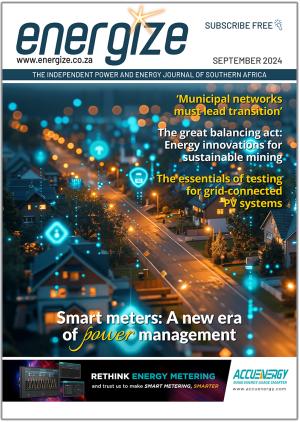by Maagatha Kalavadakken, on behalf of Wärtsilä
Imagine a power system operator in South Africa as the head of a diverse family, trying to maintain a harmonious household of electricity supply. Just like siblings with their unique quirks, strengths, and weaknesses, our power system operator juggles the challenges of providing power, addressing load shedding, and transitioning to a cleaner energy future.
Like any household, it takes work to keep it all running smoothly and patience to keep all the personalities happy. Let’s dive into this sassy sibling analogy.

Meet the first sibling, the happy and bubbly one - just like renewable energy sources. They bring a burst of excitement and green goodness to the family but beware their intermittent nature. Just when you think they've got it all together, they might decide to take a break and leave you hanging. The power system operator must navigate their unpredictable behaviour, managing the fluctuations of renewable energy while harnessing its eco-friendly potential.
Now, onto the eldest sister, the dependable and reserved one - the coal supply of our family. Like a trusted rock, she's been there for ages, providing stability and warmth. But hey, let's not ignore the elephant in the room - the carbon emissions. While coal has been a reliable workhorse, the power system operator must balance its drawbacks with the need to decarbonise and embrace cleaner alternatives. It's like telling your sister, "You've got the reliability, sis, but we need to work on your eco-friendly side too."
Enter the eldest brother - the versatile one, our flexible gas supply. He's a jack-of-all-trades, able to adapt to any situation with ease. Need more power? He's got your back. Need less? No problem, he can dial it down. The power system operator utilises this flexibility to address load shedding and system balancing, ensuring a smooth power supply even when the demand fluctuates, gas steps up and says, "I've got the power to go with the flow."
And yet as versatile as gas is, the system operator must think about where to build the plants as harsh weather outcomes and altitudes can significantly impact electrical output. In his book, Truth to Power, former Eskom CEO André de Ruyter, said that burning gas at 1,600 metres above sea level is far from ideal as there would be a loss of 20% of the potential plant efficiency due to lower air pressure and oxygen levels.
While it is true that burning gas at higher altitudes can result in lower air pressure and oxygen levels, a 20% derating is not universally true for all technologies. The extent of this impact varies depending on the specific technology and design of the power plant; we can say this with surety as we have an additional sibling in the mix - Wärtsilä, the game-changer of the family.
At Wärtsilä, we understand the importance of adapting to various challenges and optimising the performance of gas plants, even in demanding conditions. Our commitment to research and development enables us to address efficiency and reliability concerns.
We have also done extensive studies and models around the role of gas, emphasising its 'insurance' role in the power system. Our modelling reveals that gas plays a vital role in maintaining a reliable supply, especially during real-world events like adverse weather, unexpected coal failures, transmission line issues, and delays in new capacity commissioning. With gas power capacity factors ranging from 5-50%, it ensures a resilient power system for the foreseeable future.
What does this tell us? Firstly, there is an undeniable need for gas to ensure power supply reliability. Dispatches ranging from 5-50% could be anticipated at any time, adapting to the system's changing dynamics. Secondly, smaller, flexible gas-to-power projects are achievable and urgently needed to alleviate South Africa's power crisis. These projects offer shorter construction times and simpler permitting processes which can provide quicker relief.
And finally, gas not only enables a more sustainable power system by supporting renewable energy integration but also fast-tracks its transition to carbon-free through the development of innovative fuels. Wärtsilä's expertise helps to ensure the lifetime role of gas in our power system, bridging the gap to a cleaner future.
In this lively household of energy sources, we must appreciate the importance of a well-rounded family dynamic. Just as I still need all my siblings, the power system operator relies on the unique strengths of each energy source. Together with gas insurance, we can navigate load shedding challenges, power South Africa reliably, and pave the way towards a sustainable and brighter future.















